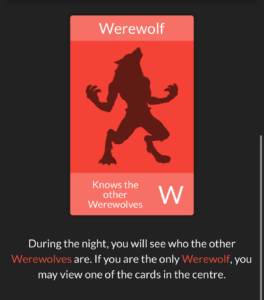One-Night Ultimate Werewolf is a condensed version of the game Ultimate Werewolf, and is a social deduction game designed by Ted Alspach and Akihisa Okui and published by Bezier Games. For this week’s play session, I played the online version on netgames.io, created by Luke Tsekouras, on my phone. The game is catered towards teens and adults, and is a great party game where critical thinking and social deduction are key.
When you’re playing One-Night Ultimate Werewolf for the first time, you might immediately think of the game Mafia, a popular social deduction game that One-Night Ultimate Werewolf is adapted off of. There are some key differences between One-Night Ultimate Werewolf and Mafia, though. The most obvious difference is that One-Night Ultimate Werewolf only lasts one round, while Mafia has multiple rounds until the Mafia or the Villagers win. And since One-Night Ultimate Werewolf is a one-round game, the developers introduced many special roles and multiple win or lose conditions depending on which roles are in play. While Mafia and One-Night Ultimate Werewolf have the same core mechanics, One-Night Ultimate Werewolf mods these mechanics to further emphasize the presence of social deduction in a one-round game.
The first mechanic that One-Night Ultimate Werewolf mods from Mafia is the mechanic of hidden roles and unique abilities. Each player is given a role, whether it be a werewolf, villager, or one of the special roles, and no one knows the role of another player. The mechanic of hidden roles is the basis for the social deduction aspect of the game, where players will bluff, deceive, or reveal their role in order for their role to win. The special roles in One-Night Ultimate Werewolf are what make the game so compelling, though. For example, the Troublemaker role has the ability to swap the roles of two players they choose, and the Robber has the ability to swap roles with another player and view it. With these many special abilities, there are more possibilities, such that you yourself might get swapped to different role and not know it until the game is over. This aspect adds to the social deduction, where you might not be deceiving everyone else, but yourself instead. This happened to me during the playthrough, where I was originally a Villager but ended up being a Werewolf.

One-Night Ultimate Werewolf also mods Mafia’s day and night phases. In the night phase, the werewolf does not choose to kill someone. This, and the feature that the game is only one-round, allows for all players to participate fully until the game ends, instead of a player sitting out because they died the first round. In the day phase, players participate in discussion and discourse to uncover who the werewolf is, or if they are even in play. The back-and-forth discussion in the game fosters fellowship, whether good or bad, exploration as players try to piece together role abilities to decide who to kill, and competition as players leverage their role’s abilities to try to win over others.

After discussion, all the players must decide one person to kill, and the outcome of the vote decides which role or roles win the game. One-Night Ultimate Werewolf places a heavy emphasis on the vote, as there are multiple win or loss conditions depending on what roles are in play. For example, if a Tanner is in play, they win if they are killed. Since the game is only one-round, the one time that you get to vote either decides whether you win or lose. Having multiple win conditions dependent on which roles are in play and the game only being one-round emphasizes the social deduction that occurs as the game is being played.

In conclusion, One-Night Ultimate Werewolf mods Mafia to create a shorter but higher-stakes social deduction game. The addition of many special roles adds to the complexity of the game, which increases the learning curve for new players, but adds a lot of possibility each time you play. The game borrows the core aspects of the classic social deduction game Mafia, but adds tasteful mods that emphasize social deduction. The game promotes fellowship, competition, and exploration as you try to deduce which roles are in play and decide who to kill.




